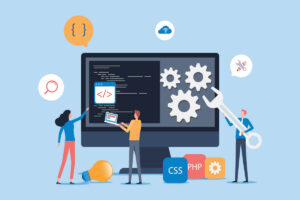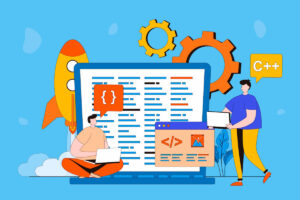Choosing the right programming language is a key decision that can significantly affect the success of web development projects. This blog post aims to provide a detailed comparison of PHP and Python, two of the most popular programming languages, to help developers make an informed choice. The focus of our discussion will be on PHP vs. Python, examining various aspects such as performance, ease of learning, available frameworks and libraries, community support, and typical use cases.
Performance Comparison of PHP vs. Python in Web Development
Web development projects require careful consideration of the tools and technologies employed, as they directly influence functionality, performance, and ultimately, user satisfaction. Among the plethora of programming languages available, PHP and Python stand out due to their robust features and extensive use in web development. Understanding the strengths and limitations of each is essential in making an informed decision on which to use for specific project needs.
PHP: An Overview
PHP (Hypertext Preprocessor) is a server-side scripting language that has powered web development for over two decades. The designers aimed for web development when creating this tool, making it popular for building dynamic web pages and applications. PHP has continuously evolved throughout its history, introducing significant improvements in performance, security, and versatility. Its built-in functions and support for various databases make PHP a go-to option for web developers looking to build efficient and scalable solutions.
Python: An Overview
Python’s simplicity, readability, and versatility as a high-level, interpreted programming language make it renowned. Since its inception, Python has been embraced by developers for its straightforward syntax that mimics natural language, making it an excellent choice for beginners and experienced programmers alike. Python’s extensive standard library, along with powerful frameworks such as Django and Flask, facilitates the rapid development of web applications, ranging from simple projects to complex, data-driven websites.
Comparative Analysis
- Performance: When comparing PHP vs. Python in terms of speed and efficiency, both languages have optimized their performance over the years. PHP 7.x versions have shown significant improvements, making PHP competitive with Python’s execution speeds.
- Syntax and Ease of Learning: Python’s clean syntax is easier for beginners to grasp compared to PHP’s complexity. This can lead to faster learning and development times in Python.
- Frameworks and Libraries: Both languages boast a rich ecosystem of frameworks and libraries. PHP’s Laravel and CodeIgniter, and Python’s Django and Flask, provide developers with robust tools for web development, although Python is perceived to have an edge in scientific and data analysis applications due to its extensive libraries.
- Community Support and Documentation: The PHP vs. Python debate extends to their communities. Both languages have large, active communities offering extensive documentation, forums, and third-party resources.
- Use Cases: PHP has been traditionally used for server-side scripting and web development, while Python’s use cases extend beyond web development to include data analysis, machine learning, and scientific computing, making it a more versatile tool overall.
Making the Decision
Choosing between PHP and Python for a project involves considering several factors such as the project’s specific requirements, the development team’s expertise, and future maintenance considerations. PHP might be preferable for projects requiring extensive backend development with a traditional web server approach, whereas Python could be the better choice for applications involving complex data processing or that benefit from Python’s diverse ecosystem.
Future Trends
Emerging trends in web development, such as the increased use of artificial intelligence, machine learning, and data analysis, may give Python an advantage due to its strong standing in these fields. However, PHP continues to evolve, focusing on enhancing performance, security, and modern web development capabilities, ensuring it remains a relevant and powerful choice for developers.
- Increased Adoption of AI and Machine Learning: With Python’s robust libraries and frameworks for AI and machine learning, such as TensorFlow and PyTorch, its adoption in projects requiring these technologies is expected to rise further.
- Internet of Things (IoT): Python, with its simplicity and readability, is becoming a popular choice for developing IoT applications. Its vast array of libraries allows for easy interaction with hardware and processing of data.
- Enhanced Performance Improvements in PHP: Efforts to enhance the performance of PHP through JIT (Just-In-Time) compilation in PHP 8 and beyond could revitalize its use in new web development projects.
- Focus on Cybersecurity: With increasing concerns about cybersecurity, both PHP and Python communities are likely to emphasize developing more secure frameworks and libraries to protect against common vulnerabilities.
- Progressive Web Apps (PWAs): PHP could see a resurgence in its use for backend development in PWAs, combining web and mobile app features, as it continues to streamline and simplify its development processes.
Conclusion
In the debate of “PHP vs. Python” for web development, both languages offer compelling features and capabilities. The choice between PHP and Python ultimately depends on the project requirements, developer preference, and long-term goals. Developers can strategically decide based on discussed factors to maximize success in the dynamic web development landscape.
For more information or to discuss your specific project requirements and how they align with the capabilities of PHP and Python, do not hesitate to contact us. Our team of experts is ready to provide guidance, answer your queries, and help you make the best decision for your web development needs.












+ There are no comments
Add yours